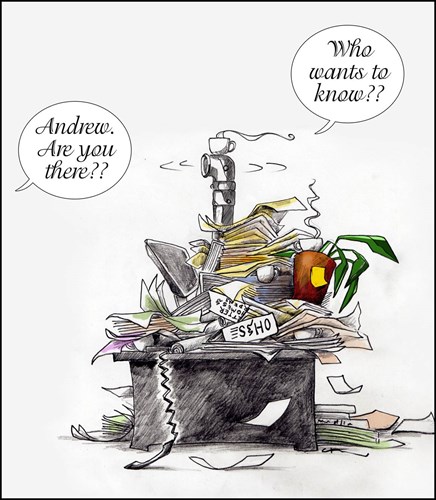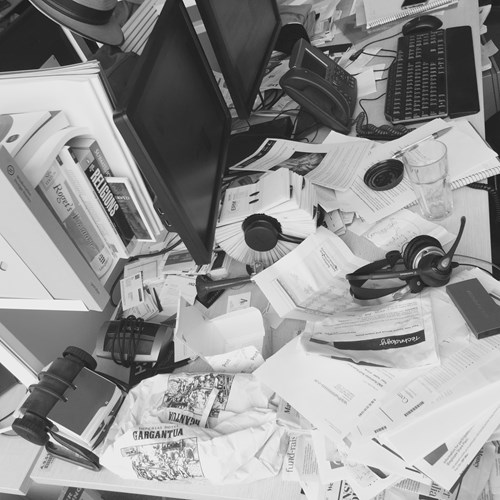-
We know at BlueNotes – courtesy of our most-read story –the tie or no tie with business suit debate is a hostile one. But we've found another: desk management. Our publisher, Paul Edwards, was so stunned by the state of the desk of our managing editor, Andrew Cornell, he tweeted a pic of it.
" If a cluttered desk is a sign of a cluttered mind, of what, then, is an empty desk a sign?"
Albert Einstein, Theoretical physicist, exponent of messy desksIt sparked such a blizzard of polarisation we commissioned our management correspondent and author of the tie-atribe, Leo D'Angelo Fisher, to investigate. A neat-desk man himself, his argument was less than convincing to the Publisher who asked for – and was granted – a right of reply, which you can read here.
So what's your view, does a neat desk signify a proper order of things or are clutter, chaos and creativity aligned?
{CF_IMAGE}
Managers who insist on clean-desk policies are revealing more about themselves than the workplaces they are ostensibly trying to reform. Despite scant evidence to support the nostrum a tidy desk means a tidy mind, managers of an officious bent have long attempted to institute clean-desk regimes. Usually with disastrous results.
Employees – at least, those still with desks to call their own in this enlightened age of hot-desking – bristle at attempts to enforce clean-desk policies.
First and foremost, they reject clean-desk edicts from above because no good reason is ever proffered for such a draconian policy. The CEO's distaste for clutter is hardly a matter of concern to the office worker. How individuals choose to work, and the immediate environment in which they do so, assuming the observance of basic standards of decorum, is surely a personal matter.
If one employee surrounded by stacks of manilla folders, coffee cups, newspapers and family photos produces much better work than another at a pristine desk, which employee is the most valuable to the organisation?
“Bill, your report left a lot to be desired, and we may have lost the Henderson account because of it, but that's a spotless desk you have there. I'm particularly taken with how your arrange your pencils. And is that Mr Sheen I smell? Let's play golf on the weekend. I think it's time we discussed a promotion," said no manager in corporate history. (Well, actually, I can think of a few, but the point remains.)
AN EMPTY DESK
We all know where Albert Einstein stood (or sat) on the matter of clean desks versus lived-in desks:
“If a cluttered desk is a sign of a cluttered mind, of what, then, is an empty desk a sign?" he was quoted.
An empty (that is, clean) desk is a sign its occupant, or more likely the busy-body manager who has mandated a clean-desk policy, is almost certainly suffers from obsessive-compulsive disorder or reads too many management books.
I once worked for a business newspaper whose publisher and CEO was a fastidious, urbane and beautifully groomed man who had three pet hates: gossip, smoking and untidy desks. Talk about being in the wrong business.
Every few months he would issue a memo reminding staff the company had a clean desk policy – which dictated before employees left for the day they must remove everything from their desks.
It was a policy fiercely resisted by the hard-working staff who resented having to pack boxes of files at the end of a long day and unpack them again in the morning. I was the editor in charge of the floor and regular toe-to-toes with the CEO (“It's not how journalists work!") if nothing else kept the staff entertained. The rules would be enforced for a week or two until in exasperation he would relent. Until the next memo.
It was pretty clear his fixation with clean desks tended to hit a climax when things weren't going his way. A heated telephone conversation in his office, usually resulting in the phone being slammed down with some force, would generally result in him storming out of his office and, standing akimbo, declare: “These desks are a disgrace!"
Which is to say a manager or CEO who preoccupies himself with the state of employees' desks has something else going on. Advocates of clean desk policies postulate what a cluttered desk says about its occupant. But it's the clean desk nut that should be on the couch.
Who's to say what is going on in the mind of the CEO who is rendered apoplectic by the sight of a half-eaten muffin on a worker's desk?
Any attempt by journalists to quiz CEOs on their reasons for instituting clean-desk policies will be met with the same response: “We don't comment on on-desk matters."
{CF_IMAGE}
COUNTER-PRODUCTIVE
Companies that go to the trouble of formally mandating what personal items may be kept on a desk do so in the name of efficiency and productivity. But when a company bans employees from keeping plants on their desks – “to avoid the introduction of unintended plant diseases" – as one big Australian company infamously did, or limit employees to one A5 photo frame or (but not and) a framed award, is a boost in productivity really the likely outcome?
Harvard Business School management academic Professor Rosabeth Moss Kanter told The Australian Financial Review clean-desk policies are counter-productive.
“If people can't express their individuality at work, then you also don't get their best ideas and their motivation," she said.
“People can order people not to have any objects on their desk but you can't order them to think and come up with something creative that will make a contribution to the company."
Research by the University of Groningen in the Netherlands found a messy desk can result in clearer thinking. Researchers concluded that contrary to “conventional wisdom that a disorganised and messy environment can clutter one's mind and complicate one's judgments", clutter forces people to focus and think more clearly about tasks and problems at hand.
“Messy desks may not be as detrimental as they appear to be [because] the problem-solving approaches they seem to cause can boost work efficiency or enhance employees' creativity in problem solving," the researchers state in their 2012 paper published in the Journal of Consumer Research.
Workplaces are changing rapidly and dramatically in response to a range of factors, but one aspect of the workplace that is not changing is that employees remain individuals. The companies that recognise, value and nurture that individuality stand to benefit the most from their employees' innovation, creativity and motivation.
And whatever form it might take, there is nothing more individual and personal as an employee's workspace.
You can read BlueNotes' publisher Paul Edward's right of reply here.
Leo D'Angelo Fisher specialises in the practice and malpractice of management. In more than three decades as a business journalist he has worked for BRW, The Australian Financial Review and a range of other business magazines in Australia and Hong Kong. His sometimes acerbic observations of management and its fads has brought him a wide following. He blogs at leodangelofisher.com.
The views and opinions expressed in this communication are those of the author and may not necessarily state or reflect those of ANZ.
-
-
EDITOR'S PICKS
-
As my toes wriggle contently in their (Italian, designer) leather sandals, freed from the shackles of sky-high Tom Ford pumps, I praise Casual Friday.
24 November 2015 -
A lot of men seem to have decided it's time to discard the tie for work. Yet, in most cases, they still wear a suit. Frankly, it just isn't a good look. It is a rare man indeed who can get away with wearing a suit without a tie. Those who can would probably look fetching in a barrel and braces...
17 November 2015 -
We know at BlueNotes – courtesy of our most-read story –the tie or no tie with business suit debate is a hostile one. But we've found another: desk management. Our publisher, Paul Edwards, was so stunned by the state of the desk of our managing editor, Andrew Cornell, he tweeted a pic of it.
15 January 2016


